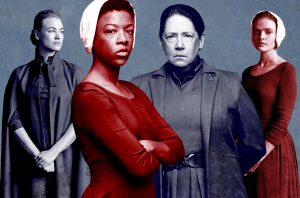By: Rachel Harmon
*Spoilers below*
While I may be late in the game to finally watch The Handmaid’s Tale, I am certainly glad I did. The Handmaid’s Tale is a Hulu original series based on Margaret Atwood’s 1985 novel by the same name. This dystopian, fictional story centers around Offred, a handmaid, who is forced to bear children, as she is one of the very few women who is still fertile in her society. Offred defies her commander and stands up for herself to escape the horrible life in which she lives. The series presents many ideas that are strikingly similar to current issues surrounding women’s reproductive rights, such as: women fulfilling their “biological purpose” as bearers of children, and women degrading themselves to avoid the tortuous consequences of rebelling against patriarchy. These ideas are not farfetched, for there many governments around the world that subjugate women’s bodies and reproductive rights.

It does not shock me anymore in our current social climate that some people would fall into the notion of following strict Conservative Christian values. The women in The Handmaid’s Tale were reduced to serving men and the home by being servants, gaining permission from their husbands to do anything, and being stripped of their jobs. This was only achieved by a huge following (mostly men) that would enforce this because the women had passions and jobs that were outside of strict Conservative Christian values. Thus, it was degrading and disgusting the way the men of the society treated the women since they were forced to completely change their way of life.
In addition to changing their way of life, the women were treated in the most horrifying ways I have ever seen on television. This treatment seemed counterintuitive, because the men were treating the handmaids as the lowest of all women, despite their being the only fertile women of their society, and in my opinion, the most valuable. You would think they would receive the best treatment, considering the circumstances, but no. The handmaids were raped, beaten, cattle pronged, isolated, and tortured. You would think the most valuable people in that society would be treated like royalty, but they were hardly treated like human beings. In Atwood’s society, the commanders trade the handmaids as commodities with other countries that do not have fertile women. The handmaids were only seen as concubines; once they give birth, they were sent to another family to start the process all over again.
The Handmaid’s Tale made me think about how women are treated today. We are still demeaned in our workspaces, cat-called in the street, and seen as sexual objects. It is ridiculous that we have to try more to be seen more, believed more, and heard more. Even though we are human beings, it is still like we are fighting to prove this to everyone.
In an article about the similarities between the TV show and today’s political climate, Jennifer Armstrong corroborates the notion that Margaret Atwood’s novel cannot be categorized as science fiction because it “mirror[s] the United States’ embrace of conservatism…as well as the increasing power of the Christian right and its powerful lobbying organizations” (Armstrong, 2018). Atwood’s novel confronts the United States’ concerns of “the rising political power of Christian fundamentalists, environmental concerns, and attacks on women’s reproductive rights” (Armstrong, 2018). These are no different than the concerns in 2019.
While The Handmaid’s Tale presents a scary alternate reality that seems removed from our current American society, it is not as strange as we might believe.
This is what truly scares me. Women have come so far in terms of living outside of the home and being their own individual person that it would be heartbreaking to see this progress all be for nothing. We cannot dismiss Atwood’s story as pure fiction because women are being oppressed by society now. We cannot be naïve as we watch this show, and more importantly, we cannot believe that this could never happen to the United States. It could, and we should be active in supporting organizations that will uphold abortion rights, access to equitable pay, contraceptives, and education. We cannot become complacent in believing that we are done fighting for our rights and we must continue to fight every day.
Sources:
Armstrong, Jennifer Keishin. “Culture – Why The Handmaid’s Tale Is so Relevant Today.” BBC News, BBC, 25 Apr. 2018, www.bbc.com/culture/story/20180425-why-the-handmaids-tale-is-so-relevant-today.
“Watch The Handmaid’s Tale: Season 1 | Prime Video.” Amazon, Amazon, www.amazon.com/dp/B073X7TYY2?tag=moviefone-20.
